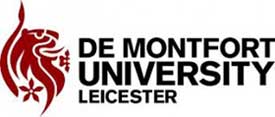About Aeronautical Engineering Msc in De Montfort University
The UK aerospace and aeronautical industry is the largest in Europe and the second largest in the world. The sector has seen consistent growth in recent years and supports a growing number of highly skilled, high-value roles in aircraft aerodynamics, wind turbine design and maintenance, aviation management, the defence sector, and aircraft maintenance, repair and operation services.
This broad-based engineering course aims to train the next generation of aerospace professionals by providing technical skills in key areas of aeronautical engineering, supplemented by topics in material sciences, digital manufacturing and management concepts. Our graduates will leave with the advanced technical know-how required to work in the aircraft industry, along with a solid understanding of relevant management concepts.
You will study core modules in Advanced Flight Dynamics, Advanced Computational Aerodynamics and Instrumentation, Sensor Networks and more, with the choice of optional modules including Aircraft Maintenance, Repair and Overhaul and Unmanned Aero Vehicle Design.
You will be supported by our academics and technicians in producing your final-semester dissertation exploring a relevant topic of your choice.
Key features
-
Study specialist technical modules related to aeronautical engineering, as well as management modules, such as Engineering Business Environment, to prepare for work in a rapidly changing, globalised world.
-
Learn and use software packages used in aeronautical engineering applications and research, such as MATLAB, ANSYS and OpenFOAM, which will give you the ability to work confidently in an industrial environment.
-
Benefit from the research and industrial experience of our teaching staff who have worked in international research institutions, including the National Aeronautical Laboratories India, Central Aerohydrodynamic Institute Russia and AMST-Systemtechnik GmbH Austria.
Entry criteria
You should have the equivalent of a British Honours degree (2:2 minimum) in a relevant subject, such as Aeronautical/Aerospace Engineering, or a closely related discipline such as Mechanical Engineering or Automotive Engineering.
We are happy to consider equivalent qualifications from anywhere in the world.
If English is not your first language an IELTS score of 6.0 or equivalent when you start the course is essential. English Language tuition, delivered by our British Council accredited Centre for English Language Learning, is available both before and throughout the course if you need it.
If you have no formal academic qualifications but do have extensive industry experience we will consider your application on an individual basis.
De Montfort University Highlights
| Type of Institution |
Public |
| Campus Setting |
Urban |
| Endowment |
£1.17 million |
| Number of Campuses |
4 faculties |
| Number/Percentage of International Students |
23205 |
| Total number of Professors |
3240 |
| Student Satisfaction Rate |
86% |
| Graduate Job Rate |
97.3% |
| Number of Residence Vacancy |
Around 3000 |
| International fee |
Undergraduates- £13240 (annual) Postgraduates- £15950 (annual) |
| Number of Academic Programs |
UG, PG, Part time, distance, blended |
| Mode of Program |
Full time, distance and online |
| Average Graduate Salary |
19800 pounds a year |
De Montfort University The tuition fee (In GBP) for various programs is tabulated below:De Montfort University Average Cost
| Field of Study |
Avg.Fees |
| Art, Design and Humanities: |
£13,750 |
| Business and Law |
£13,750-£14,550 |
| Media |
£13,750 - £14,250 |
| Engineering |
£14,250 |
| Computing |
£14,250 |
| Health and Life Sciences |
£13,250 - £14,250 |
| Nursing BSc |
£14,950 |
De Montfort University The Average Tuition Fees and Other Expenses
| Expenses |
Estimated cost in pounds |
| Undergraduate tuition fee |
13,250- 14950 |
| Postgraduate tuition fee |
13600-15,900 |
| On campus accommodation |
5,000-6040 |
| Average cost of living |
97-110 per week |
DMU International Scholarship up to 1500 pounds
- TEF Gold Outstanding Alumni Scholarship up to 3000 pounds
- Leicester Castle Business School Scholarships:
- Global MBA Scholarship £3,000 - £5,000
- Full Postgraduate Scholarship
- LGBTQ + Allies Scholarship-two fully funded post graduate taught scholarship packages including full fee weaver and maintenance bursary.
- Vice Chancellor's Sports Scholarship- three different scholarship packages are available with eligible students being awarded up to 6000 pounds of support.
